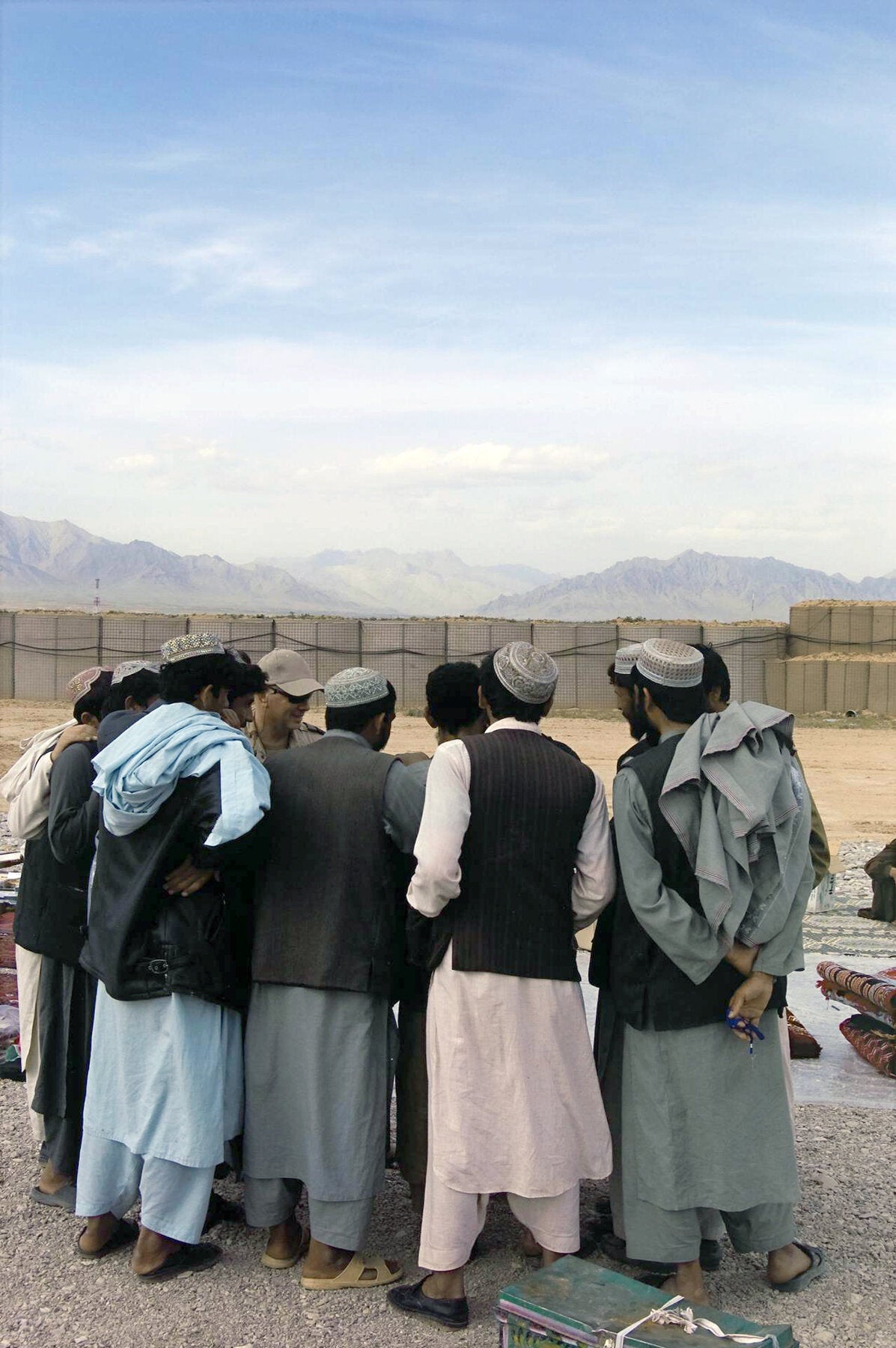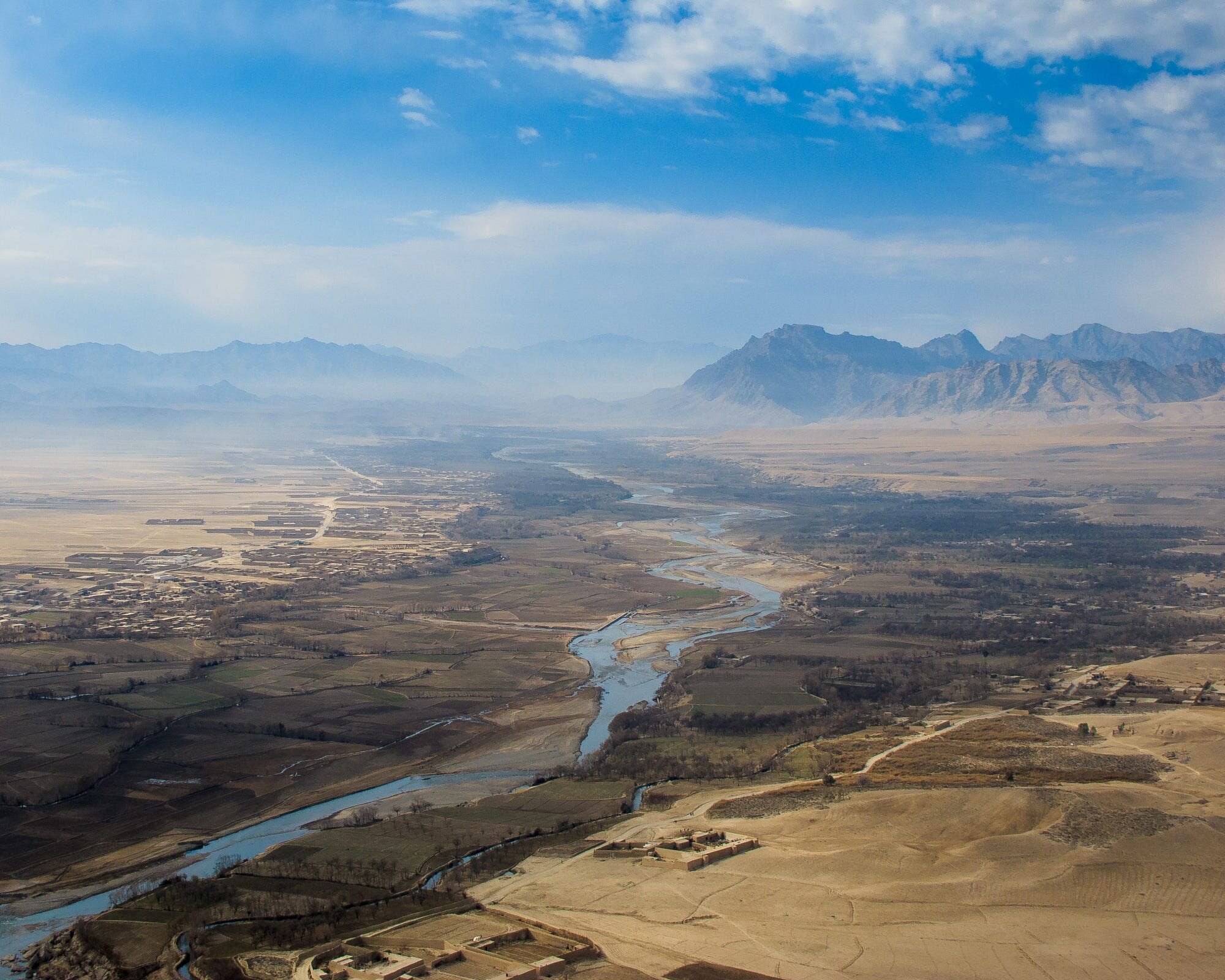
The Pull of Hunger, Pt. III

In the city’s swell, Toor Jan rushed his motorcycle through the irregular streets until the engine began to make a dying sound. He bounced over several corners before coming to the heavily guarded gate at the National Police Headquarters building. A Soviet creation, the squat building, occupied nearly five hectares with its training grounds, shura rooms, and feared prison. Unlike the other cracked and peeling buildings in the city, the headquarters was white-washed, free of grime and the wear of age.
The police officers here wore crisp uniforms, pressed and unstained, with AK-47’s greased shiny and slung professionally, very different from the cops that roamed the streets and entered villages uninvited. Three of them stood behind a pike and stopped Toor Jan. “What do you need?”
“I’m here to see the General.”
The men laughed at him. “Go away!”
“Call him.” Toor Jan got off his motorcycle and walked it toward their pike. “He knows me.”
“Toor Janna,” a soft voice called. Mir Hamza Khan stepped from the shadow of an open door. The guards popped to attention. “Come here, my friend.”
They sat at his huge desk. The wall behind Mir Hamza Khan was filled with framed pictures. Shaking hands with American commanders. Addressing police officers in formation. On operations. Wherever there was room, there was a photograph.
“Why are you here?” Mir Hamza Khan said.
Toor Jan needed money. Food for his family. Medicine. His baby had been cursed with a deformity that needed mending. Toor Jan needed friends—life impossible without them—and he would’ve remained loyal to those friends if this wasn’t Uruzgan. “I finally have a photograph of the American CIA man that you wanted.”
Mir Hamza Khan sat up. “Yes?”
“Right here,” Toor Jan said, reaching for the cell phone from his right shoe. He stopped. “I nearly died taking this.”
“That’s the price of resisting invaders, Toor Jan,” Mir Hamza Khan said blandly, filing his fingernails against his shirt. “Let me see.”
General Khan’s office looked like a palace in a Bollywood film. Thick carpets and overstuffed Western chairs upholstered in pink fabric. Gold leafed crown molding. A huge and grotesque picture of Hamid Karzai, the president of Afghanistan. A desk—Toor Jan had never seen a desk in person before—rivaled the size of a rowboat and gleamed in the light. What did Mir Hamza Khan know about the price of resistance? Toor Jan sat up, refused to hand over his phone. “I have a family.”
The General waved his hand. “Then go look after them.”
“This is how I look after them.”
“Show me the picture, Toor Jan. Or leave.”
Toor Jan found his phone, scrolled to the picture of the blonde man with the beaked nose. Not The Good American, of course, but how would Mir Hamza Khan know?
The General looked it over and handed it back. “How did you do it?”
“As you taught me, Haji Sahib.” Toor Jan had been spying for Mir Hamza Khan for three years before he met The Good American. And he’d been spying for his Talib uncle since he was a child. “But without the flash this time.”
“Why did the American take you back?”
“He needs to kill my uncle.”
The General walked around the desk and stood in front of Toor Jan. He wore a white kameez, black vest, and a black silk turban. “And they don’t suspect us?”
“Why would they? You’re their ally, Haji Sahib.”
“Your uncle is their enemy, he’s my enemy, and he’s your enemy. We’ll help the Americans get him.” He clasped his hands behind his back. “I have an idea.”
Toor Jan’s stomach went sour. He’d been the victim of great men’s ideas before. “Yes?”
“You want to feed your family.”
“That’s all that I want,” Toor Jan said to Mir Hamza Khan with his mouth and God with his heart. “There’s nothing else for me in this world.”
“Then good. You will lead the American CIA man on a raid. My police will accompany them. Once you enter the compound, point out the American CIA man to my officers, and they will shoot him.”
Toor Jan laughed, nervous. He couldn’t bring himself to shake his head or say no. A feeling, like his heart wheezing, started. What would The General do if he discovered the picture was a fake? “But my uncle is in Pakistan.”
“The Americans don’t know that.” Mir Hamza Khan returned to his desk and opened a drawer. He removed a brick of rupees and began peeling off the bills. “The information and location we provide them will be too specific for them to pass on. Besides, they go to the wrong compounds all the time.”
It’s true; The Americans got lost on the way to the most obvious places. And maybe they’d take Toor Jan on this raid but leave The Good American behind. Like a loosed arrow, he shot his hand out for the money. Several thousand rupees, enough to last for months. “When will we do this?”
Mir Hamza Khan replaced the money in the drawer. “Tomorrow night. You will be contacted with the details.”
Toor Jan’s mind whirred. Of course, The Good American would come on the raid; he was Toor Jan’s spy handler. He couldn’t let Mir Hamza Khan kill The Good American, especially before his doctors fixed the baby’s mouth. “What if we give him someone else, not my uncle? I don’t think he’ll believe someone as lowly as me would know information about The Big One.”
Mir Hamza Khan sat and pressed his fingers together like a roof’s gable, a gesture he’d seen in American gangster movies. “Then who?”
Toor Jan didn’t know. He looked at the wall of pictures. In the corner was a small photograph with no frame—three men, arms around each other and smiling, in a field of blooming poppies. Toor Jan stood up and pointed to it. “Him.”
“Haji Hyatullah?” Mir Hamza Khan turned in his chair removed the picture from the thumbtack. “He sells cars in the bazaar.”
“He sells weapons too. The Americans always want to capture men like that,” Toor Jan said. The picture of Haji Hyatullah was clear, his face completely recognizable. If Toor Jan could get it to The Good American, then they would fix his son. Toor Jan could skip the raid, take the money The General had just given him, and flee with his family to some faraway place like Kandahar or even Kabul. Maybe Toor Jan could learn skills other than spying, like farming or building fences. “Haji Hyatullah is someone they’d believe I would know.”
“Then you must have this, Toor Jan. The Americans love pictures.”
“Yes, they do,” he said, taking the picture with trembling and fearful hands.
Mir Hamza Khan revealed where Haji Hyatullah lived—in the village of Kotwal, near the third bend in the Teri River—and even sent him the weapon dealer’s cellphone number because the American’s always sought those out. When the General was sure Toor Jan understood and memorized those facts, he dismissed him.
Toor Jan was alone when he walked down the long, red-carpeted hall of the police headquarters to his motorcycle. He turned the worn photograph of Haji Hyatullah in his terrified hands. Toor Jan studied the faces of the men in the picture. One older, gray and bent. Probably an elder in the village. The elder held a younger surly, and brown man. His anger burned from the black sockets of his eyes. Finally, Haji Hyatullah. Clean, linear, and fleshy lips. A handsome face with everything in its proper place. Toor Jan flipped the picture over and back, rotating it every degree and angle until he wasn’t watching the picture anymore but how it moved in his hands. Hands free from blood. His imagination kicked up again, and American blood smeared the glossy photograph dripping down his wrists—no. Not now. First, he’d sell the photograph to The Good American, then his son would be fixed, then they’d all flee and never come back. Toor Jan said mashallah and removed his right shoe to slip the photo inside.
He came outside and found a wood crate with a bottle of pink medicine, a sack of rice, and the wrapped legs of a slaughtered lamb fastened to his motorcycle. A voice called from above. Toor Jan turned. Mir Hamza Khan hung from a window, his arms gesturing grandly. “The people say you had a baby, Toor Janna. What news!”
Home before early afternoon, Toor Jan walked his motorcycle through the gate and leaned it against the wall. Mina and Abdul Hakim waited in the courtyard. He motioned to the wood crate. “Medicine and food.” Mina unfastened the load and hurried into the house. Toor Jan wiped the dust from his face. He looked at his brother, Abdul Hakim. “Did you do what I told you?”
“What did you tell me?”
“To make sure nothing happened to this house.”
“I did, Toor Jan. What did you do all day?”
“I made sure nothing happened to this house or any of the people in it.”
Toor Jan called The Good American and asked if he wanted a picture of Haji Hyatullah. The Good American ordered Toor Jan to meet him right away after he added that he knew the location of Haji Hyatullah’s compound and cellphone number too.
“Be prepared to go on a raid tonight,” he said and hung up.
Written By Matt Cricchio
9/29/21









